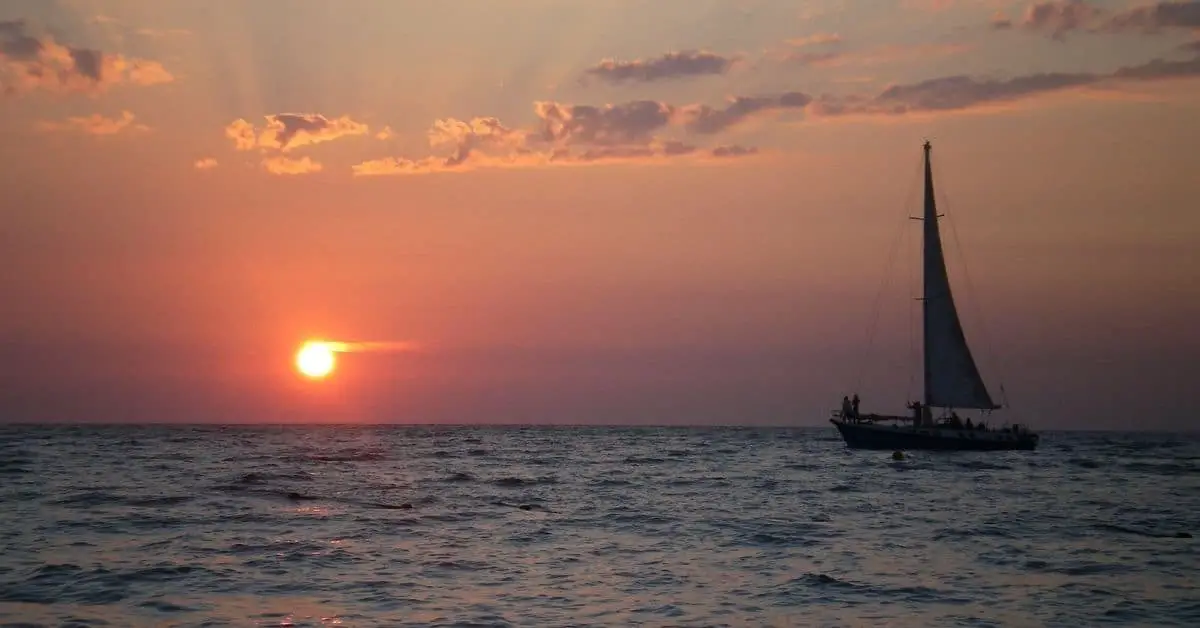Lake Michigan is the third largest of the five Great Lakes of America. The length of the lake is 321 miles and the width is 118 miles, respectively. Crossing the lake can be very challenging depending on the kind of boat you have, the weather, and the time of the season.
So, here is some things to know about crossing Lake Michigan:
- It takes about 10 to 20 hours to cross Lake Michigan on a sailboat going 5 knots (5.75 mph), depending on where you cross from.
- On a motorboat cruising at around 20 knots (23 mph), it will take around 2.5 to 5 hours to cross Lake Michigan, depending on where you cross from.
- The recommended size sailboat for crossing Lake Michigan is anything over 23 feet long.
- The recommended size motorboat for crossing Lake Michigan is anything over 28 feet long.
- Be prepared for cold weather especially if you plan on crossing overnight. Always bring some blankets and a sweatshirt.
The experience of crossing Lake Michigan can be amazing as long as you make sure you are being safe and going out when the weather is right. You don’t want to get stuck in a storm and have to deal with waves that are towering over your boat.
Continue reading to learn more about what you should know before crossing Lake Michigan.
Things to remember when crossing Lake Michigan
Lake Michigan can create some giant waves which in turn can cause you danger and/or seasickness. If you have a week stomach, or this is your first time on a long boat trip, try to look into the horizon often and stay out of the cabin. This will help you from puking, but if you have to do it, make sure that you won’t accidentally throw yourself overboard.
Additionally, even though you can appreciate a five-month sailing season here, it will, in general, get cold on the water, particularly around evening time. Along these lines, it’s essential to check the climate before takeoff and dress appropriately.
Along with those two big points, here are some smaller ones to also keep in mind before crossing Lake Michigan:
- Make sure you won’t get in any trouble with the Coast Guard or DNR (flairs, lifejackets, proper lighting, etc.)
- Bring extra gas.
- Bring extra lines.
- Always bring more food and water than you think you need.
- Make sure your radio works.
- Bring extra blankets.
Check out this article if you want to know all of the DNR requirements.
What size boat do you need to cross Lake Michigan?
While freshwater boats don’t usually need to be massive, boating on the Great Lakes is somewhat really testing. Technically, you can go out on Lake Michigan in boats that are 16 feet long on calm days; however, it’s best to go out on something closer to 23 feet long, especially if you plan on crossing Lake Michigan.
Even with a boat that is 23 feet long, you will be experiencing very harsh waves. With normal conditions, you will find yourself needing to slow down to avoid smashing your boat on a rogue wave. This is why I recommend getting something larger than 28 feet long.
Here are what some boats look like that would be good to cross Lake Michigan in
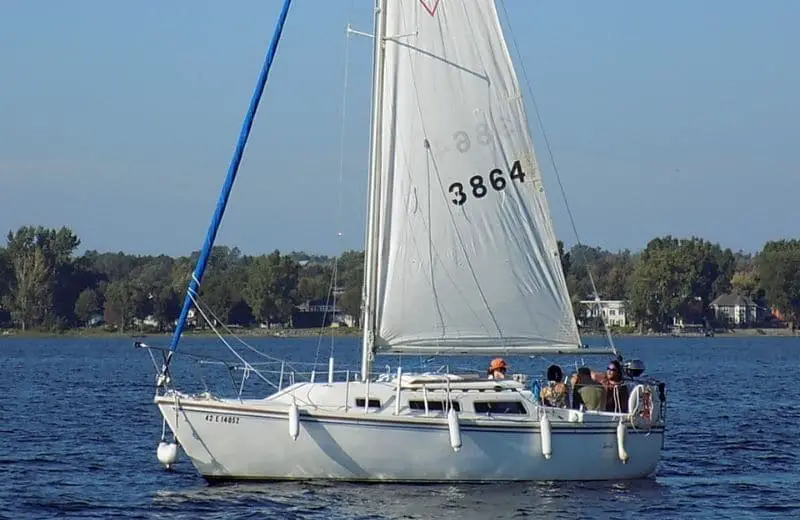
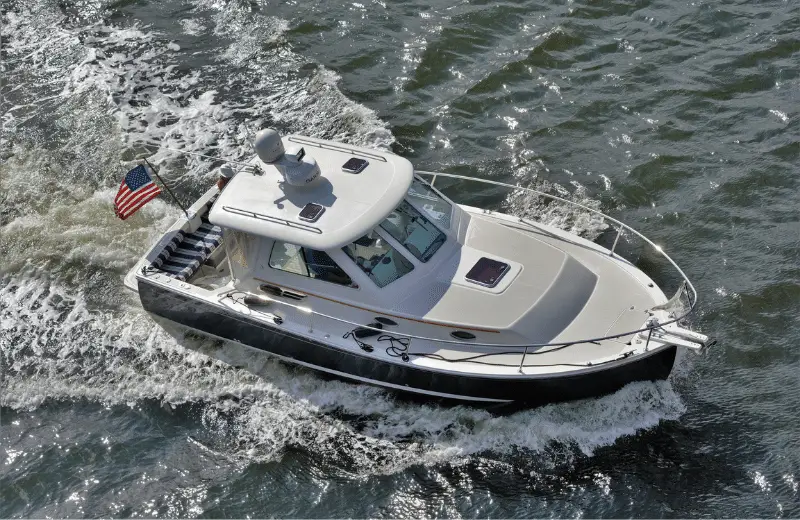
Lake Michigan waves rarely get over 4 feet high in the summertime, so as long as you believe your boat can safely take that on, you should be fine to cross. Smaller boats such as these:
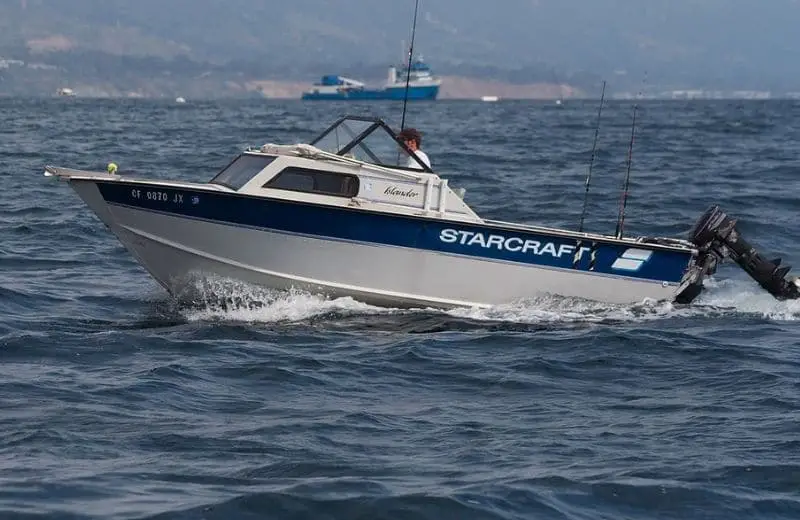
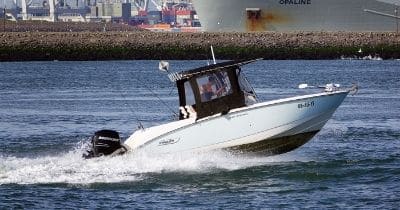
could even be used to cross Lake Michigan, but I assure you it won’t be a comfortable ride. With these boats, 2.5-foot waves are about the max they should take on to cross Lake Michigan.
Here are some boats that would not be good for crossing Lake Michigan

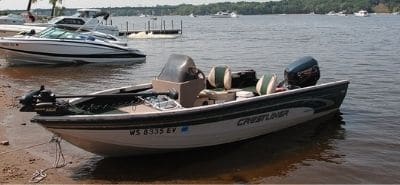
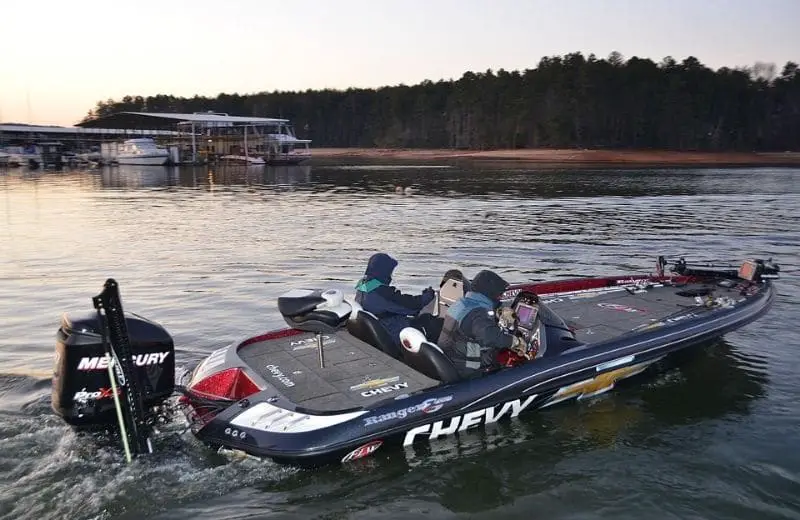
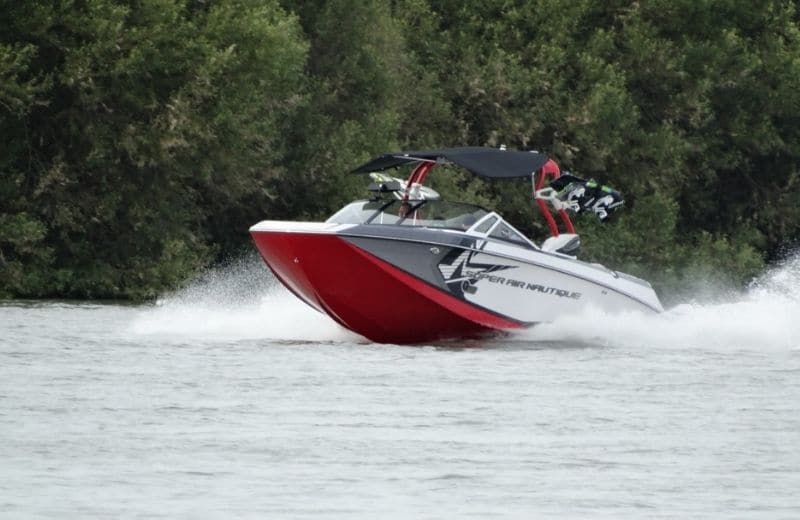
Not only are most of these boats small, but their low hulls also won’t be able to protect them from the large waves that Lake Michigan will throw at them. Therefore it’s unsafe to use a boat similar to these to cross Lake Michigan.
I always recommend only crossing with a sailboat that has a cabin and another source of propulsion besides just wind. You never know how much or how little wind mother nature will throw at you, so it’s always better to be safe than sorry.
How Long Does It Take To Boat Across Lake Michigan?
As I said at the beginning of the article, it takes about 2.5 to 5 hours to cross Lake Michigan on a motorboat and about 10 to 20 hours on a sailboat. These times will obviously fluctuate though, mostly depending on where you are crossing from, and how fast you are going.
So I went a little deeper into this and created a chart for motorboats and sailboats that shows how long your trip will actually be.
| Locations | Motorboat Time | Sailboat Time |
|---|---|---|
| Chicago to Muskegon (117mi) | 3.9-7.3 hrs | 17-25.4 hrs |
| Milwaukee to Muskegon (84mi) | 2.8-5.3 hrs | 12.2-18.2 hrs |
| Sheboygan to Muskegon (81mi) | 2.7-5 hrs | 11.7-17.6 hrs |
| Sturgeon Bay to Muskegon (127mi) | 4.2-7.9hrs | 18.4-27.6 hrs |
| Chicago to Travers City (295mi) | 9.8-18.4 hrs | 42.8-64.1 hrs |
| Milwaukee to Travers City (226mi) | 7.5-14.1 hrs | 32.7-49.1 hrs |
| Sheboygan to Travers City (185mi) | 6.2-11 hrs | 26.8-40.2 hrs |
| Sturgeon Bay to Travers City (128 mi) | 4.3-8 hrs | 18.5-27.8 hrs |
| Chicago to Ludington (155mi) | 5.2-9.7 hrs | 22.5-33.7 hrs |
| Milwaukee to Ludington (97mi) | 3.2-6 hrs | 14.1-21.1 hrs |
| Sheboygan to Ludington (64mi) | 2.1-4 hrs | 9.3-13.9 hrs |
| Sturgeon Bay to Ludington (77mi) | 2.6-4.8 hrs | 11.2-16.7 hrs |
The fluctuation in time equates to the fact that not all boats have the same cruising speed. The largest time shows a slow cruising speed at 14 knots (16 mph), and the shortest time shows a fast cruising speed at 26 knots (30 mph) for motor boats.
For sailboats, the low number is 4 knots (4.6mph), and the high number is 6 knots (6.9 mph).
How to find the best time to cross Lake Michigan
Although the experience of crossing Lake Michigan can be extremely fun and adventurous, limiting the danger of it is very important. You don’t want to get stuck in a storm or in high waves, so always check weather forecasts before you go out.
To do this, just do a quick google search on how big the waves are in your area. websites such as noaa.gov will give you the wave heights and much more information that will be useful to know. When waves start to get higher than 2.5 feet, you may want to consider waiting to cross unless your boat can handle it with ease.
Waves tend to always be larger during the offseason, so I would always recommend going in the summertime when the waves are smaller.
Conclusion
Crossing the Great Lakes either by motorboat or sailboat will surely be an amazing adventure as long as you take the right precautions. Always check to make sure your radio is working just in case something does go wrong, you can get help.
- What Is The Cheapest Way To Store A Boat? - February 28, 2023
- Do Boats Need Bottom Paint? (Uncovering the Truth) - February 2, 2023
- How Much Is Bass Boat Insurance? (Real Quotes) - January 18, 2023

